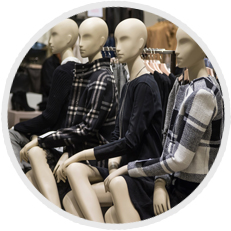Anyone who thinks on-line shopping will one day eliminate real stores hasn’t met Davey’s sister, Miley. For Miley, a day spent on a shoe safari at Silverburn or Braehead is more enjoyable than being told she’s won the lottery by Jamie Dornan.
And that’s because, although customer needs are at the centre of any retail environment, there are roles further back in the chain that ultimately make the experience much more rewarding than a simple Manolo Balik bulk buy.
With such fierce competition from online retailers, the real world experience needs to be one that is worth leaving the house for.
Providing pleasant surroundings, while offering knowledgeable advice on up-to-date ranges that are easy to find takes a team of specialists working in the background. And only when these roles come together, can the ideal selling experience be enjoyed.
The good news is moving into these specialist roles can be achieved by working from the ground up – with in-house training as opposed to any need to arrive at your interview with a sheaf of qualifications under your arm.
So what’s on offer behind the curtains? Well, first up, those responsible for what we find on the shelves – from bread to books to boots – are retail buyers. This is a role that requires experience of the organisation, a working knowledge of its customer base, and an appreciation of what it hopes to achieve.
With buying done so far ahead, future planning and an ability to spot coming trends and see how they will play with customers is essential. Although some buyers will come from other organisations and many with a retail qualification, it’s still possible to learn as an assistant: here deep knowledge is what is crucial.
It’s not really a role for someone who wants to be a professional shopper – this is about what customers want, and most importantly, what they are likely to pay. Depending on the product – and most buyers do specialise in one area – there can be a fair amount of travel involved.
Once the decisions are made, you need to get the products to the retail outlets and on to the shop floor. This role, the supply chain manager, is for someone with incredibly strong organisational skills and a good problem-solving head.
It’s easy to see why starting as a trainee in the supply chain office would provide the best background for this. If a customer is looking to buy an expensive jacket and the shipment is stuck on a French motorway, then previous experience and good contacts are essential to let the customer know precisely when it will be in stock in their size.
There are qualifications available in supply chain management and logistics for those who are happy to study.
Once the stock arrives, it needs to look as attractive as possible. This is where the visual merchandisers come in. It’s not just a case of making pretty pictures or dressing mannequins, however. Shop floors need to be intuitive and be designed to maximise sales.
Despite being behind the scenes, all of these roles are about keeping the customer satisfied. If you think you fit the bill and can help a make shoppers’ paradise, Miley will be eternally grateful.


